- Home
- Lissa Evans
Horten's Incredible Illusions Page 6
Horten's Incredible Illusions Read online
Page 6
“And now it’s gone back to wed,” said the small boy, slightly less awed.
“Yes, a very mysterious and magical world where a blue handkerchief can turn yellow …” announced Clifford, taking a blue handkerchief out of his pocket and doing the whole trick all over again. “And where a yellow handkerchief can turn blue!”
This time, only Stuart and April applauded.
“I’m getting a bit tired of handkerchiefs,” whispered one of the old ladies rather loudly.
Clifford grinned bravely. “A mysterious and magical world, ladies and gentlemen, where a white handkerchief can turn …”
There was a wail from the small boy and the noise of something small and round rolling across the floor.
“I’ve dwopped it!”
“I told you you’d drop it,” said his sister irritably.
“I’ve dwopped my candy!”
“Oh, the poor little chap’s dropped his jawbreaker,” said one of the old ladies sympathetically. “Pam, have you got a toffee in your bag?”
“Yes, I think I have. Hang on a moment.”
“And a black handkerchief can turn white!” shouted Clifford, trying to drown out the noise of wailing and rustling.
“Bleach,” said the old lady called Pam. “That’s how I turn my black handkerchiefs white. Or wash them in vinegar and leave them out in the sun.”
“I use tissues,” remarked her friend. “More hygienic.”
Clifford used the white handkerchief to mop the sweat from his forehead. “And now,” he said, “I just need a couple of moments to prepare my next trick.”
It was while Clifford was rummaging around at the side of the stage that Stuart heard a tentative knock on the outside door. There was a pause, and then a second knock, and since Stuart was nearest to the end of the row, he walked across to open it.
It was a small, pale woman in overalls, a large canvas bag slung over one shoulder, a coil of cable over the other. “The hall caretaker called me about an electrical problem,” she said. “Something about an EXIT sign that keeps going on and off.”
Stuart nodded, and pointed up at the flickering sign above the door. “It’s there,” he whispered, “but there’s a show going on at the moment.”
“Okay. Can I wait at the back till it’s finished?”
“I suppose so.”
On the stage, Clifford clumped back into view. “Sorry to keep you,” he said, “but I hope you’ll find it was worth the wait.”
The next bit of the act was a card trick, during which Clifford dropped the entire deck on the stage and had to spend about a minute and a half crawling around picking them all up again. After that, he sawed a teddy bear in half and then placed a small plant into a disappearing cabinet.
“And now we spin it around three times,” he announced, “open the door, and—”
“It’s still there!” yelled the small boy. “Why’s it still there?”
Clifford slammed the cabinet door again, and gave a desperate smile. “There’s just time for the exciting animal finale,” he announced. “I’ll take a moment to set it up.”
He clumped offstage again.
April nudged Stuart. “What do you think?”
Wordlessly he shook his head.
Clifford reappeared carrying a large empty cage, which he lowered, with effort, onto the floor at the center of the stage.
“This cage,” he announced, “is secure in every way. Do not be afraid, ladies and gentlemen, that the wild beast inside will escape and cause havoc and mayhem in the audience.”
“But there’s nuffing inside!” piped up the small boy, indignantly.
Clifford actually looked quite pleased at the interruption. “Aha!” he said. “There’s nothing there at the moment, but I shall drape this magical and mysterious cloak across the cage”—he hung a silver cape over the front—”and say the magic word, and then we may discover that it’s not quite as empty as you think….”
For the first time, an air of tension gripped the audience.
“I fink it’s going to be a cheetah,” whispered the boy, “or a buffalo, or a great big, giant, horrible snake.”
“I, er … don’t like snakes much,” said April, sounding uncharacteristically nervous.
Clifford stepped forward. He rapped the top of the cage solemnly three times, shouted, “Abracadabra!” in a slow, booming voice, and then whipped the silver cape away again and stood triumphant.
The occupant of the cage gave a slight snuffle.
Without taking her eyes off it, April nudged Stuart. “Am I going mad,” she whispered, “or is that a hedgehog?”
CHAPTER 14
“Yup,” replied Stuart. “That’s a hedgehog, all right.”
The hedgehog gave a sneeze, trotted straight between the bars of the cage, and rolled up into a ball near Clifford’s foot. Clifford bowed, and the faded purple curtains swung shut. Only Stuart and April clapped; the rest of the audience left rather quickly, everyone (apart from the small boy) hurrying past a money box labeled:
If you enjoyed
MYSTERIOSO the MAGICIAN’S act,
feel free to show your appreciation!
“Come on!” called the boy’s sister. He dropped something into the money box and ran out after her.
Stuart glanced at April, who was sitting with the notebook and pencil on her lap. “What on earth are you going to write in the review?” he asked.
“I have no idea,” she said slowly. “That was the worst act I’ve ever seen in my entire life, and that includes watching my dad come in last in a karaoke competition at my school in front of me and all my friends.”
A door opened at the side of the stage, and Clifford came through, still dressed in his silver suit. He waved at them nervously. “Well?” he asked. “What do you think?”
Stuart opened and shut his mouth a couple of times, but no sound came out.
“Interesting,” said April in an unconvincing squeak. “Unusual.”
“I was completely stumped for a finale until I found that little fellow crouched by the side of the road the other day, and I thought, I’ve never seen a hedgehog in a magic act—I wonder why no one else has ever thought of it. Brilliant idea, wasn’t it?”
“Mmm,” said Stuart, nodding vigorously.
“So, is there anything I should change for the next performance?” asked Clifford.
“The next one?” echoed Stuart.
“I’ve booked the hall again for Saturday—I need the experience. I’m serious, you see—being a magician is all I’ve ever wanted to do. I have to keep trying.”
“Right.”
“So should I change anything, do you think? The order of the tricks? The costume? The music?”
While Stuart was still working out what to say, an answer came in a small, shy voice from the other side of the hall.
“The lighting.”
It was the electrician. She was kneeling beside the door, a pair of wire cutters in one hand.
“Why? Wasn’t it bright enough?” asked Clifford.
“Too bright,” she said. “Much too bright.”
“But don’t you want to see what’s going on?”
“Not if it’s awf—” She bit her lip. “I mean … I didn’t mean …”
There was a horrible silence.
Clifford went rather pale, and then turned back to Stuart and April. “Was it awful?” he asked quietly. “Please tell me the truth this time.”
They looked at each other, and then back at Clifford.
“Yes,” they said.
“Really awful?”
“Yes.”
“Even the hedgehog?”
There was a pause.
“Especially the hedgehog,” said April. “The audience was hoping to see a gorilla or something, so it was a bit of a disappointment. Sorry.”
Clifford nodded sadly. He walked over to the money box by the exit, flipped open the lid, took out a dusty and half-sucked jawbreaker, and stared at it for a whi
le. “Yes,” he murmured. “It’s true. I was awful,” and then he turned to the electrician, who was still kneeling by her bag. “Thank you for being honest when nobody else was,” he said. “I see now that I’m just fooling myself. Jeannie was wrong about most things, but she was right to keep failing me on Grade Two Basic Magic Skills. I’ll go back to selling carpets—I was quite good at that.”
“No!” The electrician stood up, her face scarlet. “I didn’t say it to be mean. I meant the lighting—there was no mystery. You can do wonderful things with lights. You can change everything—turn the ordinary into the extraordinary, the awful into the amazing. I’ll show you …” She fumbled in her bag and took out a long, heavy flashlight. “Now watch.”
She went through the door by the stage, and pulled open the curtains. Then she started fiddling in a metal box by the side wall. After a moment there was a click and a thud, and the hall was plunged into total darkness. A few seconds later, there was another, softer click. A beam of light shot upward, and a vast shadow appeared on the back wall of the stage. Stuart gasped and stepped back. The monstrous silhouette curled and writhed, a creature from a nightmare, its head crowned like a deadly halo with vicious spikes.
The monstrous, terrifying silhouette opened its enormous, saber-toothed, bloodthirsty mouth and gave a tiny sneeze.
The lights went back on, and there was the electrician carefully cradling the very small hedgehog.
“Wonderful!” shouted Clifford, awestruck.
“Just very basic lighting,” said the electrician, blushing slightly.
“Incredible!”
“Easy.”
“Amazing!”
“It’s honestly quite straightforward.”
“What we need to do is have a talk,” said Clifford eagerly. He sprinted over to the stage, and within seconds he and the electrician were deep in conversation.
“Let’s go,” said Stuart to April. He fished a coin out of his pocket, and dropped it in the box as they left.
By the time they arrived at Beech Road, his stomach had started making loud rumbling noises. “Sorry,” he said to April, “but I haven’t eaten anything since breakfast and it must be nearly seven thirty now. I really hope Dad’s made pizza. Or spaghetti. Or french fries.”
He opened the door and smelled beets.
“Hi, Dad,” he said, entering the kitchen. There were pots and pans everywhere, the sink was crammed with dirty dishes, and cookbooks lay piled beside the stove. “What’s going on?”
“A domestic culinary extravaganza,” said his father, whose glasses had steamed up in the heat, “in keeping with your mother’s exhortation to keep you supplied with sufficiently nutritional comestibles.”
Stuart looked around and saw a mountain of peels. Depression swept over him. He suddenly missed his mom. “You mean you’re cooking hundreds of vegetables?” he asked.
His father nodded. “Beet consommé, followed by leek, carrot, and broccoli gratin accompanied by a frisée salad consisting of endive, curly kale, peas, and bacon.”
“Bacon?” repeated Stuart eagerly.
“Actually,” admitted his father, “I recall that I was so absorbed in the preparation of the vegetable content of the salad that I omitted to add the bacon.”
“You mean you forgot to put bacon in the bacon salad?”
“A regrettable error.”
“So it’s a vegetable starter, followed by a vegetable main course, with a side helping of vegetables? And none of the vegetables are potatoes?”
“Indeed.”
Stuart groaned but he actually felt like stamping his feet or even lying down on the floor and having a huge tantrum like a toddler. “I want a burger,” he muttered under his breath. “A triple cheeseburger with a double helping of fries.”
His father had already started ladling out purple soup. “And how was the exposition of prestidigitation?” he asked over his shoulder.
“I don’t know what you’re talking about,” said Stuart crossly.
“The exponent of legerdemain?”
“Nope. Still don’t understand.”
“The magic show?”
“See,” said Stuart rudely. “You don’t have to talk in long words all the time. You can speak just like other people when you try, can’t you?” And then, ignoring the hurt look on his father’s face, he grabbed a bag of chips from the cupboard, and ran all the way up to his bedroom.
He sat and ate them without much enjoyment, knowing that he’d been rotten. Downstairs, the phone rang. He heard his father answer it, and then he heard footsteps coming up the stairs, followed by a gentle knock on the door.
Stuart opened it.
“It’s for you,” said his father, holding out the phone.
CHAPTER 15
Stuart took the receiver.
“Hello?” he said.
“The kid?” asked a crackly American voice, the voice of someone extremely old. “Are you the kid?”
“Which kid?” asked Stuart. His father was already heading downstairs again, his shoulders drooping rather sadly.
“The kid who found the tricks?”
“Yes. My name’s Stuart.”
“Well, thank my stars I can understand you. The guy who answered the phone—was he speaking in code, or what? I never heard a bunch of words like that in my whole life.”
“That’s my father,” said Stuart. “He’s very clever,” he added loyally.
“And how about you? Are you clever? Or are you smart—which is a whole heap better than being clever?”
“Excuse me, but who are you?” asked Stuart.
“You can call me Miss Edie. Maxwell Lacey told me he thought you were a smart boy.”
“Who’s Maxwell Lacey?”
“He’s a lawyer. Works for me. He came to see your tricks in the museum—gray-haired fellow with a mustache.”
“I remember. He kept asking me if I was related to Tony Horten, and whether the tricks had been found on council property. He went on and on about it.”
“Lawyers aren’t paid to be interesting.“
“But why did he want to know?”
“Because I’d given him a job to do.“
“What job?”
“To buy the tricks. Buy them all. And if he’s going to buy them, he needs to find out who owns them.“
“I do,” said Stuart.
“Can you prove that?“
There was a pause, and then Stuart shook his head, forgetting for a moment that he was on the phone. The voice on the other end of the line was so vivid and vital that he could almost picture the speaker: ancient and white-haired but crackling with life.
“Well?” she demanded, still waiting for her answer.
“No …” he said hesitantly. “I can’t prove it.”
“I thought so.” She gave a dry laugh that ended in a cough. “And I spoke to Maxwell Lacey earlier today. He’s been poking about in the basement of that town library of yours and he’s found a local law that says everything found on council property belongs to the mayor, unless there’s legal proof otherwise. And where’s your mayor?“
“She disappeared,” said Stuart.
“I know she did. So there’s a mess. You’ve got no proof, and the town’s got no mayor. Could take years to sort out. And I don’t have years—I might not even have months—and I want those tricks.”
“Why?”
“I promised my grandma I’d get them.”
“Your grandma? But she must be … I mean, the tricks are about fifty years old, and surely your grandma must have—”
“My grandma died eighty-five years ago.”
“But—”
“And before she died she told me something I’ve never forgotten. Hidden in one of the tricks—it’s well hidden, she said—is Tony Horten’s will. And it leaves everything to the person who finds it.”
“But—”
“It’d be all the proof you’d need. Find that will, and the tricks are yours to keep.”
&nbs
p; “But—”
“Or yours to sell. I’d pay you a good price for them.”
“Hang on,” said Stuart. He felt as if he were being buffeted by a strong wind—strong enough to push him in a direction that he didn’t want to go. He tried to make his voice sound firm and certain. “Hang on. Even if there is a will—and I still don’t understand how your grandma could possibly have known that—and even if I could find it, I don’t want to sell the tricks. If I can actually prove they’re mine, then I want to keep them.”
“Fine words.”
“But I really mean it.”
“I see.” The speaker coughed again—a dry, jagged sound. “You know, there’s something particular about me that you don’t know,” she said.
“What?”
“I’m rich. Very, very rich. I am Rich with a great big golden capital R. My grandma was a businesswoman, the smartest you could ever meet. She left England with ten pounds in her pocket and a head full of ideas, and she set up a factory in Canada and made more money than you would ever believe. It’s all mine now. I’m the last one left, and I can give away as much of it as I like. Do you know what it means to be rich?”
“No,” said Stuart.
“It means you can get anything you want. What do you want, Stuart?”
Stuart hesitated. “Nothing that I can buy,” he said.
“Now that’s an interesting kind of answer. Let me see if I can guess what you mean…. Maxwell Lacey tells me that you’re new in town and you’re just a little fella—smaller than the other kids. Must be hard, especially when you’re starting at a new school in a couple of weeks’ time. Kids can be cruel, especially kids you haven’t grown up with, and if you’ve got a name like S. Horten, then you’re going to get a nickname real quick. Am I right?”
Stuart said nothing, but he could feel his face grow hot. He thought of all the times in his life he’d been called Shorty Shorten. The phone was sticky in his grasp. Miss Edie’s voice continued, crackly and compelling.
“Money sure can’t buy you height, but it can buy you power. The best bike in town, the best computer, the best sneakers, the best parties, the best vacations—you ever been to Disneyland?”
“No,” muttered Stuart, his voice hoarse.

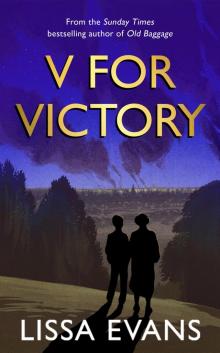 V for Victory
V for Victory Old Baggage
Old Baggage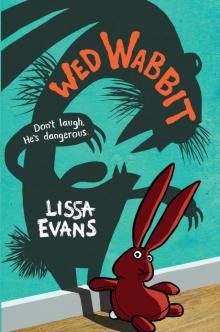 Wed Wabbit
Wed Wabbit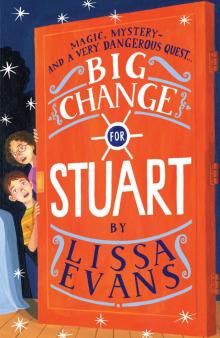 Big Change for Stuart
Big Change for Stuart Spencer's List
Spencer's List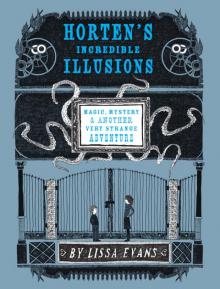 Horten's Incredible Illusions
Horten's Incredible Illusions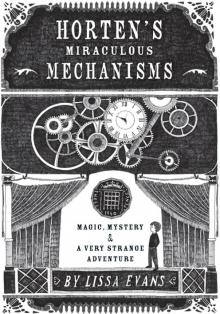 Horten's Miraculous Mechanisms
Horten's Miraculous Mechanisms Their Finest Hour and a Half
Their Finest Hour and a Half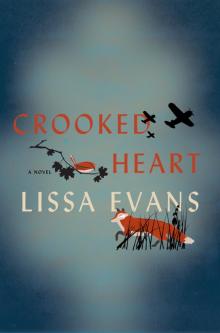 Crooked Heart
Crooked Heart